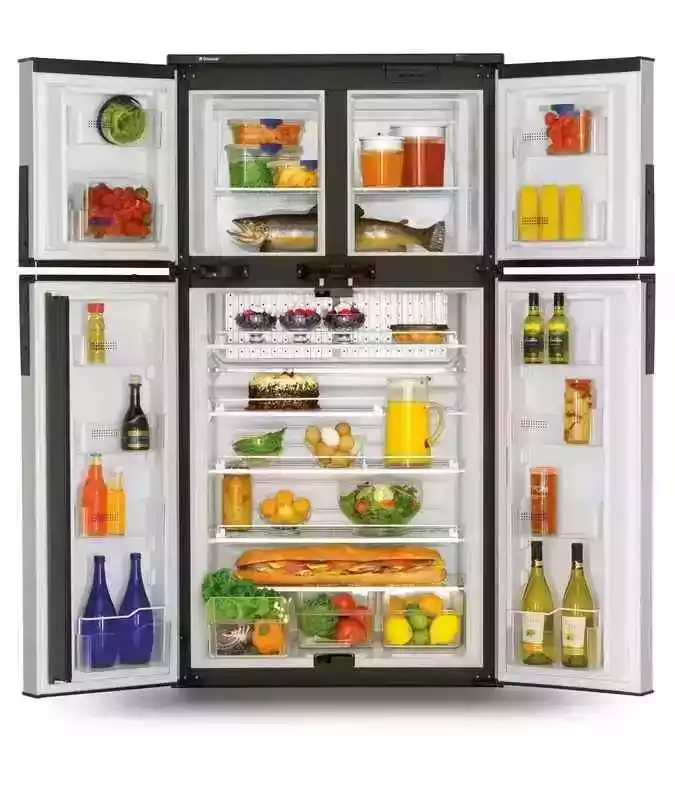Table of Contents
Are you planning a road trip with your RV and need a reliable RV refrigerator to store your food and drinks? Choosing the right RV fridge can be a daunting task, especially if you’re not familiar with the different types and features available. Fortunately, with the wide selection of fridges for sale and RV fridge sales on the market today, there’s a type of this essential appliance for everyone. In this refrigerator buying guide, we will provide you with everything you need to know before making a purchase for your RV.
Size and Capacity: Choosing the Right Refrigerator for Your RV
When selecting a refrigerator for your RV, it’s essential to consider the size and capacity that will meet your needs. The type of RV you have, the number of people traveling with you, and the length of your trips are factors that will determine the size and capacity of the refrigerator you should choose.
When selecting a refrigerator for your RV, it’s essential to consider the size and capacity that will meet your needs.
Portable Fridges
Portable 12-volt RV refrigerators are an excellent option for small RVs or those with limited space. These fridges are compact and can be easily moved around. They are ideal for short trips, day trips, or as an additional refrigerator for larger RVs. Portable fridges typically have a capacity of 15 to 50 liters. However, 12 volt RV refrigerators tend to be expensive relative to their storage capacity
Camper Fridge
Camper fridges are designed for larger RVs and offer more storage capacity than portable fridges. They are usually available in single-door or double-door configurations and range in size from 50 to 200 liters. Camper fridges can run on electricity or propane, and some models even have a freezer compartment.
Truck Fridge
Truck fridges are a popular choice for truck drivers who spend extended periods on the road. These fridges are compact and can easily fit into the cab of a truck. They are available in a variety of sizes, ranging from 15 to 90 liters. Some models can be powered by the truck’s battery, while others require a separate power source.
Marine Refrigerator
Marine refrigerators are specially designed to withstand the harsh marine environment. These fridges are ideal for boats, yachts, and other watercraft. Marine refrigerators are available in a variety of sizes and configurations, ranging from 20 to 200 liters. Some models have a built-in freezer compartment, while others do not.
Power Sources
RV fridges can be powered by different sources, including electricity, propane gas, or both. It’s important to consider the type of camping you will be doing and the availability of power sources when choosing a refrigerator. Compressor refrigerators are powered by electricity only, while absorption refrigerators can run on both electricity and propane gas.
Most RVs have a combination 110-volt electric/propane RV refrigerator installed. This is called a 2-way fridge. Three-way RV fridges add 12-volt as a power source, but running a heat or cooling generating appliance on 12 volts wil drain your coach batteries fairly quickly unless you have a large battery storage capacity. It’s recommended to only use 12 volt power while the RV is moving so that the engine is recharging the coach batteries as you consume electricity with the fridge.
Energy Efficiency
Energy efficiency is an important factor to consider when choosing an RV fridge. The more energy-efficient the refrigerator is, the less power it will consume, which can save you money on your energy bills. Look for refrigerators with an Energy Star rating, which indicates that they meet or exceed the energy efficiency guidelines set by the EPA.
The Cooling System: Keeping Your Refrigerator Running Efficiently
The cooling system is a vital component of any refrigerator in an RV, and it’s important to understand how it works and how to keep it running efficiently. The cooling system typically consists of a compressor, condenser, evaporator, and refrigerant.
1. Compressor
The compressor is the heart of the cooling system and is responsible for circulating the refrigerant. It compresses the refrigerant into a high-pressure gas, which is then circulated to the condenser.
2. Condenser
The condenser is located on the outside of the RV and is responsible for removing heat from the refrigerant. As the refrigerant flows through the condenser, it releases heat and condenses into a liquid.
3. Evaporator
The evaporator is located inside the RV and is responsible for absorbing heat from the refrigerator’s contents. The liquid refrigerant flows through the evaporator and evaporates, absorbing heat from the air inside the fridge.
4. Refrigerant
The refrigerant is a chemical compound that absorbs and releases heat as it flows through the cooling system. The most common refrigerants used in RV fridges are ammonia, hydrogen, and helium.
Fridge Thermometers
Fridge thermometers are a helpful tool to ensure your refrigerator is running efficiently. These thermometers can be placed inside the fridge to monitor the temperature and ensure it stays at a safe level. It’s recommended to keep the fridge temperature between 35 and 40 degrees Fahrenheit.
Additional Features
Some refrigerators come with additional features such as ice makers, water dispensers, and digital displays. While these features can be convenient, they can also add to the cost of the refrigerator. Consider which features are important to you and whether they are worth the extra cost.
Additional Considerations when Purchasing
Maintenance and Repairs
Proper maintenance and repairs are essential for the longevity of your fridge. Look for refrigerators with easy-to-clean surfaces and removable shelves for easier maintenance. It’s also important to consider the availability of replacement parts and whether the manufacturer offers repair services.
Proper maintenance and repairs are essential for the longevity of your fridge.
Warranty and Support
Warranty and support are important considerations when choosing a refrigerator. Look for refrigerators with a warranty of at least one year and check what the warranty covers. Consider whether the manufacturer offers customer support and repair services.
Installation and Set Up
The installation and set-up process of a refrigerator in and RV can vary depending on the type and model of the refrigerator. It’s important to follow the manufacturer’s instructions carefully or hire a professional to install the refrigerator for you.
Price Range
RV fridges come in different price ranges, with absorption refrigerators generally being less expensive than compressor refrigerators. The price of the refrigerator will also depend on its size, capacity, and features.
Brand Reputation and Customer Reviews
When choosing a refrigerator for your RV, it’s important to consider the reputation of the brand and read customer reviews. Look for brands with a good reputation for quality and reliability and check what other customers are saying about the product. This can give you a better idea of the refrigerator’s performance and whether it’s a good fit for your needs.
The most used brands of RV refrigerators in North America are Dometic and Norcold.
Conclusion
Choosing the right camper refrigerator can make a big difference in the comfort and convenience of your RV trip. Consider factors such as the type, size, power source, energy efficiency, cooling system, additional features, maintenance, warranty, and price when making your decision. Don’t forget to read customer reviews and consider the reputation of the brand before making your purchase.
FAQs
Can I use a household refrigerator in my RV?
No, household refrigerators are not designed for the vibrations and movement of an RV and may not function properly.
How long does an RV refrigerator typically last?
The lifespan of a refrigerator for RV use can vary depending on the type, usage, and maintenance, but they typically last 10-15 years.
Do I need to defrost my RV’s refrigerator?
Most refrigerators in RVs do not require defrosting, but it’s important to follow the manufacturer’s instructions for maintenance.
Can I run my RV’s refrigerator on solar power?
Yes, it is possible to run an refrigerator in an RV on solar power, but it requires a solar power system that is large enough to power the refrigerator. Because the fridge is generating heat through a heating element to heat up the coolant, it uses a lot of battery power than, say, lighting fixtures. So a larger than normal battery bank would be required to run a fridge on solar, especially during hours of darkness.
Can I install a refrigeratorin an RV myself?
It’s recommended to have a professional install the refrigerator to ensure it’s done correctly and safely. The electrical connections and more critically, the LP propane gas connections need to be done safely.
















